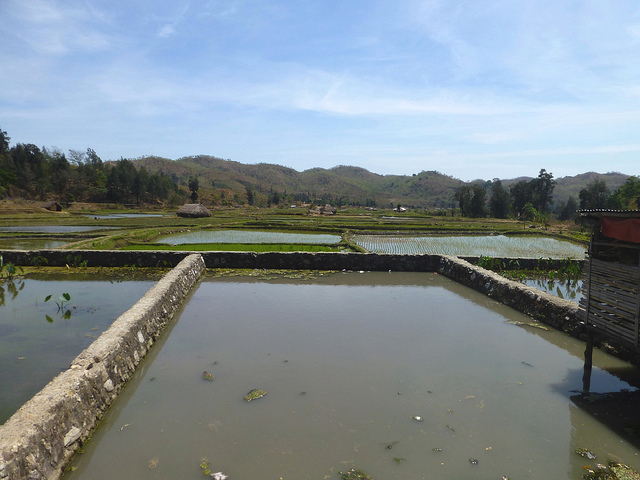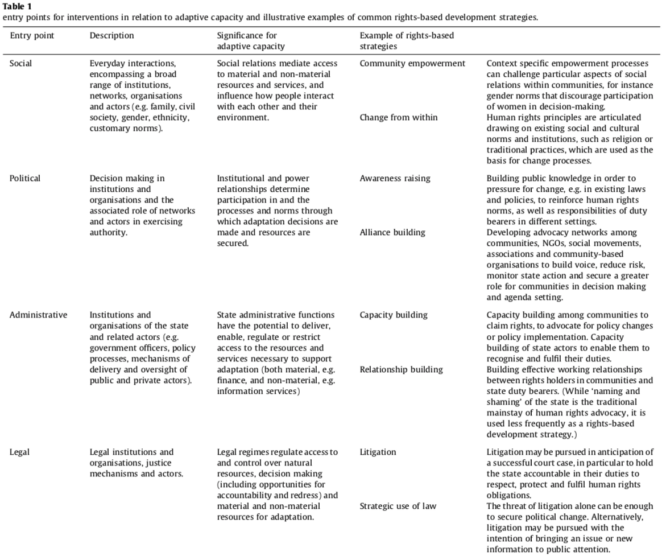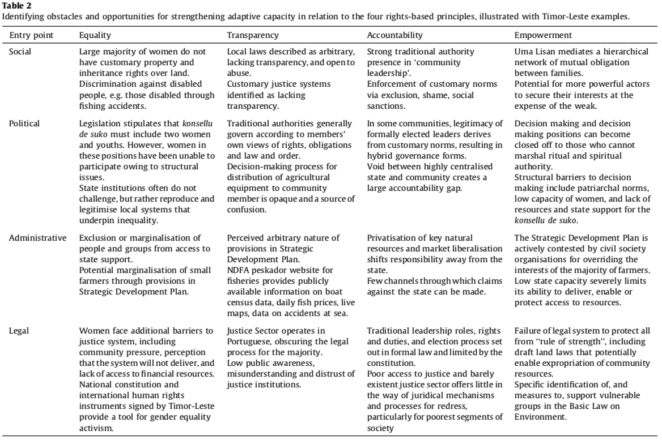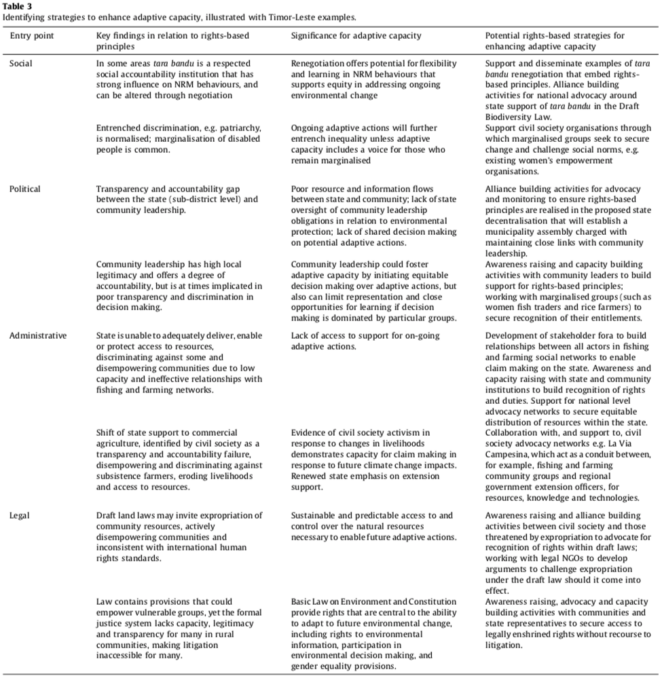A rights-based perspective on adaptive capacity for aquatic agricultural systems in Timor-Leste

Introduction
Whilst it is increasingly recognised that socio-political contexts shape climate change adaptation decisions and actions at all scales, current modes of development typically fail to recognise or adequately challenge these contexts where they constrain capacity to adapt.
To address this failing, this paper* considers how a rights-based approach broadens understanding of adaptive capacity while directing attention towards causes of exclusion and marginalisation. Drawing on human rights principles and lessons from rightsbased practice, the authors develop a novel analytical tool for use with communities that considers adaptive capacity through examination of equality, transparency, accountability and empowerment. This is applied to the illustrative case of aquatic agricultural systems in Timor-Leste. This approach yields a qualitative analysis that unpacks the formal and informal institutions and actors that structure opportunities and barriers to adaptive actions.
This paper was published in Global Environmental Change in March 2015 (closed access).
*Access the full article here or see links below. To view larger versions of the tables please right-click and open them in a new browser window.
A rights-based analysis of adaptive capacity: brief overview
The focus of rights-based practice in a development context is explicitly on changing the balance of power within society and between state and society in favour of the marginalised.
Entry points

The different entry points for development actions are summarised in the paper as social, political, administrative, and legal (table 1, above; from page 5 of the full text). Rights-based actions can be mapped to each.
These four entry points provide a structure for applying a participatory approach to rights-based analysis. By providing focal points for participatory dialogue this framing ensures the analysis links to development interventions.
Four rights-based principles
These principles enable a qualitative analysis of the structure of power and authority in relation to the institutions and actors at different scales that influence local capacities to adapt to climate change.
- Equality:By applying this principle, this study aims to identify how, why and to what extent certain individuals and/or groups may be marginalised in formal and informal processes and actions, including access to goods and services, social relations, and voice in decision making.
- Transparency: Qualitative participatory approaches look to understand how, why and to what extent public actions and decisions are rendered transparent to local people.
- Accountability: A focus on accountability makes use of participatory methods to explore the elements and mechanisms that form networks of accountability between community members and public and private actors.
- Empowerment:Challenging norms of structure and agency may demand overturning deeply held privileges or practices. Solidarity groups, social movements or lasting associations with NGOs are significant in securing the potential for such change.
Adaptive capacity in Timor-Leste: Methods and Tools
- Participatory network mapping activities were used to capture in-country perspectives on key actors currently influencing farming and fishing livelihoods, and their decision-making and power relationships.
- Analysis of formal and informal governancebased on a combination of the Collaborative Governance Assessment and the FAO forest governance assessment tool. This employed data from primary literature and data collected during semi-structured interviews at the local, sub-district and national level.
- Institutional analysis to understand community perspectives on the effectiveness of farmers’ and fishers’ interactions with institutions that provide support to rural livelihoods. This used a survey of open-ended and multiple choice questions and was completed by a total of 150 fishers and farmers from the two locations.
Adaptive capacity in Timor-Leste: obstacles and opportunities
Examples of obstacles and opportunities for strengthening adaptive capacity in relation to the four rights-based principles are provided in table 2 below (from page 7 of the full text) and illustrated with Timor-Leste examples.

Adaptive capacity in Timor-Leste: key findings
Table 3 below (from page 8 of the full text) illustrates opportunities for action flow that from the analysis undertaken in this study. These strategies encourage adaptation planning to expand beyond addressing immediate problems (e.g. infrastructure and job creation), towards addressing underlying inequality and how it structures risk and opportunity.
Several of the potential actions propose building alliances or developing/increasing support for advocacy networks. These are rights-based strategies that have been shown to open up new spaces for accountability (where those with power become answerable for their actions), while fostering transparency and empowering new actors to become involved in decision making.

Lessons Learnt
- This study suggests this tool can be used as the basis for participatory work with vulnerable communities, in which qualitative methods are used to probe the practical implications of gaps and opportunities related to equality, transparency, accountability, and empowerment.
- In reviewing a range of data from Timor Leste, this study found multiple constraints resulting from different forms of marginalisation of those in working in aquatic agricultural livelihood systems.
- Accountability gaps across and between scales undermine potential avenues to disrupt established patterns of power and discrimination.
- Different forms of discrimination are evident in social norms, the distribution of state support, and access to formal justice, which persist despite legal reforms and, indeed, through state institutions that legitimise local systems of inequality.
- Hierarchy based in customary norms excludes certain groups from participating in decision making, compounding failures to challenge the way power is distributed in social institutions and manifested in state actions or access to justice.
- This approach explicitly engages with the underlying politics in development practice, showing how pre-existing inequalities yield deficits in adaptive capacity, and how they can be addressed.
Suggested citation
Ensor, J.E., Park, S.E., Hoddy, E.T. and Ratner, B.D., 2015. A rights-based perspective on adaptive capacity. Global Environmental Change, 31, pp.38-49.
Further reading
- Climate-Smart Agriculture Sourcebook and Platform
- Bringing rights into resilience: revealing complexities of climate risks and social conflict
- What about gender in climate change? Twelve feminist lessons from development
- Routes to resilience: insights from BRACED year 1
- Mangrove ecosystem and shrimp aquaculture in SW Bangladesh
(0) Comments
There is no content